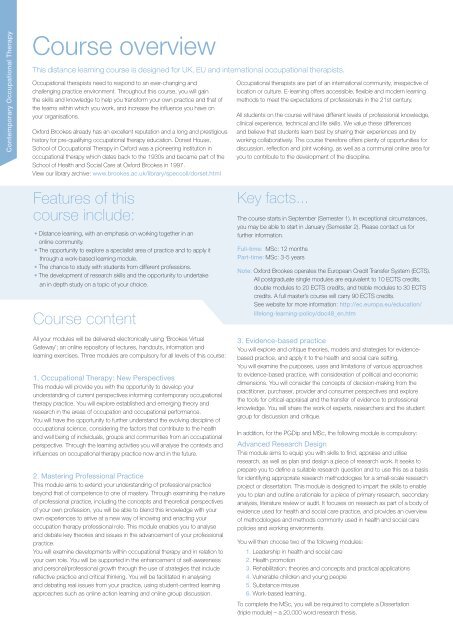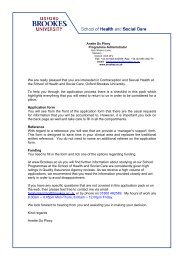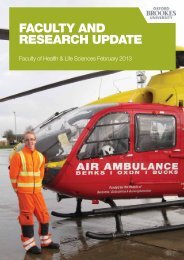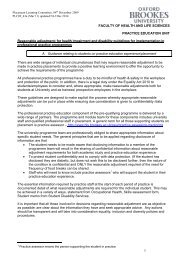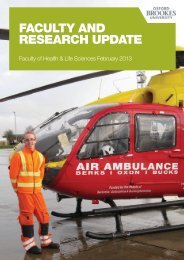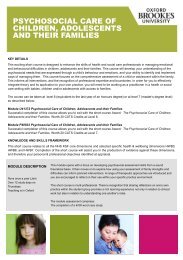Contemporary Occupational Therapy - Faculty of Health and Life ...
Contemporary Occupational Therapy - Faculty of Health and Life ...
Contemporary Occupational Therapy - Faculty of Health and Life ...
You also want an ePaper? Increase the reach of your titles
YUMPU automatically turns print PDFs into web optimized ePapers that Google loves.
<strong>Contemporary</strong> <strong>Occupational</strong> <strong>Therapy</strong>Course overviewThis distance learning course is designed for UK, EU <strong>and</strong> international occupational therapists.<strong>Occupational</strong> therapists need to respond to an ever-changing <strong>and</strong>challenging practice environment. Throughout this course, you will gainthe skills <strong>and</strong> knowledge to help you transform your own practice <strong>and</strong> that <strong>of</strong>the teams within which you work, <strong>and</strong> increase the infl uence you have onyour organisations.Oxford Brookes already has an excellent reputation <strong>and</strong> a long <strong>and</strong> prestigioushistory for pre-qualifying occupational therapy education. Dorset House,School <strong>of</strong> <strong>Occupational</strong> <strong>Therapy</strong> in Oxford was a pioneering institution inoccupational therapy which dates back to the 1930s <strong>and</strong> became part <strong>of</strong> theSchool <strong>of</strong> <strong>Health</strong> <strong>and</strong> Social Care at Oxford Brookes in 1997.View our library archive: www.brookes.ac.uk/library/speccoll/dorset.html<strong>Occupational</strong> therapists are part <strong>of</strong> an international community, irrespective <strong>of</strong>location or culture. E-learning <strong>of</strong>fers accessible, fl exible <strong>and</strong> modern learningmethods to meet the expectations <strong>of</strong> pr<strong>of</strong>essionals in the 21st century.All students on the course will have different levels <strong>of</strong> pr<strong>of</strong>essional knowledge,clinical experience, technical <strong>and</strong> life skills. We value these differences<strong>and</strong> believe that students learn best by sharing their experiences <strong>and</strong> byworking collaboratively. The course therefore <strong>of</strong>fers plenty <strong>of</strong> opportunities fordiscussion, refl ection <strong>and</strong> joint working, as well as a communal online area foryou to contribute to the development <strong>of</strong> the discipline.Features <strong>of</strong> thiscourse include:• Distance learning, with an emphasis on working together in anonline community.• The opportunity to explore a specialist area <strong>of</strong> practice <strong>and</strong> to apply itthrough a work-based learning module.• The chance to study with students from different pr<strong>of</strong>essions.• The development <strong>of</strong> research skills <strong>and</strong> the opportunity to undertakean in depth study on a topic <strong>of</strong> your choice.Course contentAll your modules will be delivered electronically using ‘Brookes VirtualGateway’; an online repository <strong>of</strong> lectures, h<strong>and</strong>outs, information <strong>and</strong>learning exercises. Three modules are compulsory for all levels <strong>of</strong> this course:1. <strong>Occupational</strong> <strong>Therapy</strong>: New PerspectivesThis module will provide you with the opportunity to develop yourunderst<strong>and</strong>ing <strong>of</strong> current perspectives informing contemporary occupationaltherapy practice. You will explore established <strong>and</strong> emerging theory <strong>and</strong>research in the areas <strong>of</strong> occupation <strong>and</strong> occupational performance.You will have the opportunity to further underst<strong>and</strong> the evolving discipline <strong>of</strong>occupational science, considering the factors that contribute to the health<strong>and</strong> well being <strong>of</strong> individuals, groups <strong>and</strong> communities from an occupationalperspective. Through the learning activities you will analyse the contexts <strong>and</strong>infl uences on occupational therapy practice now <strong>and</strong> in the future.2. Mastering Pr<strong>of</strong>essional PracticeThis module aims to extend your underst<strong>and</strong>ing <strong>of</strong> pr<strong>of</strong>essional practicebeyond that <strong>of</strong> competence to one <strong>of</strong> mastery. Through examining the nature<strong>of</strong> pr<strong>of</strong>essional practice, including the concepts <strong>and</strong> theoretical perspectives<strong>of</strong> your own pr<strong>of</strong>ession, you will be able to blend this knowledge with yourown experiences to arrive at a new way <strong>of</strong> knowing <strong>and</strong> enacting youroccupation therapy pr<strong>of</strong>essional role. This module enables you to analyse<strong>and</strong> debate key theories <strong>and</strong> issues in the advancement <strong>of</strong> your pr<strong>of</strong>essionalpractice.You will examine developments within occupational therapy <strong>and</strong> in relation toyour own role. You will be supported in the enhancement <strong>of</strong> self-awareness<strong>and</strong> personal/pr<strong>of</strong>essional growth through the use <strong>of</strong> strategies that includerefl ective practice <strong>and</strong> critical thinking. You will be facilitated in analysing<strong>and</strong> debating real issues from your practice, using student-centred learningapproaches such as online action learning <strong>and</strong> online group discussion.Key facts...The course starts in September (Semester 1). In exceptional circumstances,you may be able to start in January (Semester 2). Please contact us forfurther information.Full-time: MSc: 12 monthsPart-time: MSc: 3-5 yearsNote: Oxford Brookes operates the European Credit Transfer System (ECTS).All postgraduate single modules are equivalent to 10 ECTS credits,double modules to 20 ECTS credits, <strong>and</strong> treble modules to 30 ECTScredits. A full master’s course will carry 90 ECTS credits.See website for more information: http://ec.europa.eu/education/lifelong-learning-policy/doc48_en.htm3. Evidence-based practiceYou will explore <strong>and</strong> critique theories, models <strong>and</strong> strategies for evidencebasedpractice, <strong>and</strong> apply it to the health <strong>and</strong> social care setting.You will examine the purposes, uses <strong>and</strong> limitations <strong>of</strong> various approachesto evidence-based practice, with consideration <strong>of</strong> political <strong>and</strong> economicdimensions. You will consider the concepts <strong>of</strong> decision-making from thepractitioner, purchaser, provider <strong>and</strong> consumer perspectives <strong>and</strong> explorethe tools for critical-appraisal <strong>and</strong> the transfer <strong>of</strong> evidence to pr<strong>of</strong>essionalknowledge. You will share the work <strong>of</strong> experts, researchers <strong>and</strong> the studentgroup for discussion <strong>and</strong> critique.In addition, for the PGDip <strong>and</strong> MSc, the following module is compulsory:Advanced Research DesignThis module aims to equip you with skills to fi nd, appraise <strong>and</strong> utiliseresearch, as well as plan <strong>and</strong> design a piece <strong>of</strong> research work. It seeks toprepare you to defi ne a suitable research question <strong>and</strong> to use this as a basisfor identifying appropriate research methodologies for a small-scale researchproject or dissertation. This module is designed to impart the skills to enableyou to plan <strong>and</strong> outline a rationale for a piece <strong>of</strong> primary research, secondaryanalysis, literature review or audit. It focuses on research as part <strong>of</strong> a body <strong>of</strong>evidence used for health <strong>and</strong> social care practice, <strong>and</strong> provides an overview<strong>of</strong> methodologies <strong>and</strong> methods commonly used in health <strong>and</strong> social carepolicies <strong>and</strong> working environments.You will then choose two <strong>of</strong> the following modules:1. Leadership in health <strong>and</strong> social care2. <strong>Health</strong> promotion3. Rehabilitation: theories <strong>and</strong> concepts <strong>and</strong> practical applications4. Vulnerable children <strong>and</strong> young people5. Substance misuse6. Work-based learning.To complete the MSc, you will be required to complete a Dissertation(triple module) – a 20,000 word research thesis.


